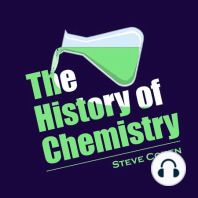18 min listen
43: Elemental Masters
ratings:
Length:
27 minutes
Released:
Dec 13, 2022
Format:
Podcast episode
Description
Here we learn about how scientists in the early 20th Century gradually became able to create isotopes, convert transmute elements from one to another, and eventually the invention of new, artificial isotopes not found in nature, such as phosphorus-31. We hear of tritium and carbon-14. Then we get to George Hevesy and his idea of radioactive tracing, including a prank he pulled on his landlady. Finally we get to scientists filling in the last gaps (unknown, undiscovered elements) up to uranium on the periodic table by the mid-1940s.Support the show Support my podcast at https://www.patreon.com/thehistoryofchemistry Tell me how your life relates to chemistry! E-mail me at steve@historyofchem.com Get my book, O Mg! How Chemistry Came to Be, from World Scientific Publishing, https://www.worldscientific.com/worldscibooks/10.1142/12670#t=aboutBook
Released:
Dec 13, 2022
Format:
Podcast episode
Titles in the series (100)
5: The Rise of Khemeia by The History of Chemistry
